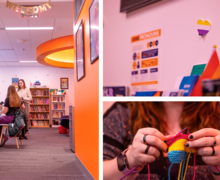Boosting local businesses can repair Syracuse’s growing lack of tourism revenue
Daily Orange File Photo
Our columnist argues that local businesses suffer economic disparities when students leave on breaks and SU is obligated to help them.
Get the latest Syracuse news delivered right to your inbox.
Subscribe to our newsletter here.
The impact of the pandemic has exacerbated economic issues well known to college towns dependent on student spending. Marshall Street is a central hub for such businesses, encountering unique challenges during academic breaks when its primary source of revenue exits almost entirely.
While some Marshall Street businesses have survived the pandemic, the loss of the Sheraton Hotel poses a possible challenge: revenue generated from families, tourists and visitors during breaks will likely fall. Tourism generates $900 million per year for the entire county, most of which takes place during the summer months. Without the Sheraton, businesses near campus may face greater revenue loss during this time, making it difficult to earn what they may have lost from students alone.
So what incentives can encourage locals to visit Marshall Street when students are away?
The Syracuse Downtown Committee is a not-for-profit organization with a mission to improve Downtown Syracuse’s economic vitality. The committee published a survey collecting the demographics of current Downtown businesses in 2022, and specifically found a spike of Black female business owners in the neighborhood between 2020 and 2022.
Black Citizen Brigade and 210 Teas are two examples of Black female-owned businesses opening their doors between 2020 and 2022. Based on the 2023 survey, a majority of the business owners are younger than 45, 29 percent identify as non-white and one-in-six are immigrants.

Cindy Zhang | Digital Design Director
There was an upward trend of new businesses pioneered by Black women in 2022, but on average, businesses owned by people of color stay open for only two years. This is bleak compared to their white male counterparts, whose businesses are open for 18 years on average.
The survey may provide valuable insights into the economic landscape of Downtown by showcasing an encouraging rise in Black women business owners, but as we delve into the broader challenges faced by businesses, a spotlight falls on those in close proximity to Syracuse University.
In response to the data collected by the Syracuse Downtown Committee, programs and grants like the Black Equity & Excellence Fund have started to support the very businesses we see with large disadvantages.
The Syracuse Downtown Committee’s survey advocates for more extensive research in other areas of Syracuse. The data found can then be presented to city representatives and the wider community, and emphasize an urgent need for proactive measures to support businesses, mitigating risks that could jeopardize their sustainability.
It’s essential for SU to play a part in this, and examine how the university’s growing student population and housing concerns impact local businesses. Similar surveys done by the Downtown Committee should be put in place to analyze these losses, and SU should be actively working to foster growth for local shops and restaurants around them.
With the university’s planned conversion of the Sheraton Hotel, a rise in student luxury housing and four storefronts currently available for sale on Marshall Street, there should be concern about the fate of local businesses on Marshall Street. A collection of data is necessary to see the lifespan of these businesses, and if there are trends in income when students are absent.
The data can shed a light on hurdles the businesses in proximity to the university face and how the university or city can then accommodate to remove barriers for businesses to stay open. Grants, resources and programs can then be offered that best suit the issue seen from the data.
Sarhia Rahim is a junior Policy Studies Major. Her Column appears bi-weekly. She can be reached at slrahim@syr.edu.
Published on November 14, 2023 at 12:13 am






